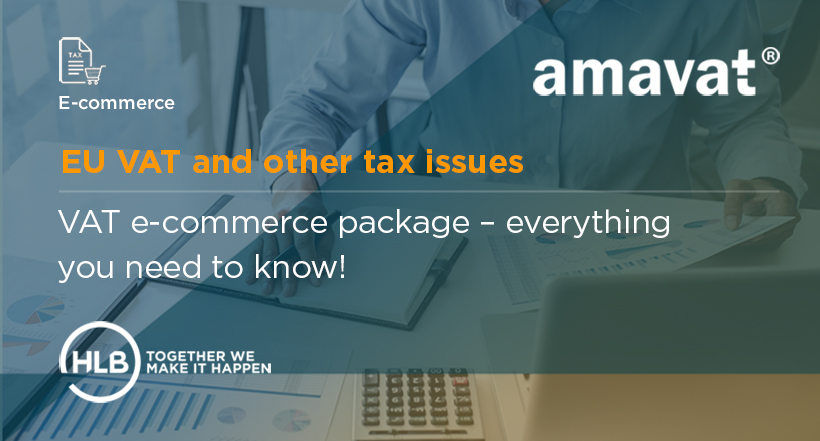VAT e-commerce package – everything you need to know!
The EU VAT package for e-commerce introduces the VAT One-Stop Shop (OSS) procedure. Since July 1, 2021, the so-called VAT e-commerce package has been in effect. Who does it apply to, and what are the key changes it brings to e-commerce accounting? What should owners of online stores selling goods to customers abroad keep in mind? What are the benefits of this solution, and how can one make use of VAT OSS? Here’s everything you need to know about the VAT e-commerce package and the VAT OSS procedure in e-commerce accounting.
In the dynamic development of the global e-commerce market, the COVID-19 pandemic has played a significant role. During this period, consumers more than ever shifted towards online platforms to order products and services. This has led to the necessity of better regulating the e-commerce industry, and consequently, e-commerce accounting. Hence, the introduction of the VAT e-commerce package, encompassing various changes and facilitations for e-retailers.
VAT for e-commerce – What is it, and which entities does it concern?
The VAT e-commerce package was implemented through the amendment to the Value Added Tax Act in June 2021. Its primary aim is to tighten regulations regarding VAT in electronic commerce and e-commerce accounting (historically, online sellers often understated the value of shipments, thereby abusing VAT exemptions), and enhance the competitiveness of EU entrepreneurs compared to sellers from, for example, Asian markets. The precise regulations pertaining to the VAT e-commerce package are outlined in the Council Implementing Regulation (EU) 2019/2026 and previously issued EU directives – 2017/2455 and 2019/1995.
The VAT package for e-commerce applies to entities providing services in the online industry, primarily owners of online stores selling goods to consumers located within or outside the EU. However, its provisions must also be applied by entities selling goods to these consumers that are imported from third countries, as well as platforms facilitating their sale and e-commerce portals, such as Amazon, Allegro, or eBay.
VAT e-commerce package – What’s new? Here are the key changes for e-commerce accounting
Among the introduced changes, as part of the VAT e-commerce package, it is crucial to highlight:
VAT OSS Procedure – Single Declaration and Sales Threshold
With the VAT e-commerce package, the VAT OSS procedure has been introduced. This allows entities subject to VAT in e-commerce to settle their accounts through a single declaration for sales to various EU countries. Settlements are conducted in euros. In the past, multiple declarations were required – separate ones for each EU member state where a business exceeded the respective sales threshold (ranging from 35,000 to even 100,000 euros). This necessitated maintaining separate VAT records in accounting for e-commerce in each European Union country.
Since mid-2021, regulations have been standardized. The new procedure introduced a uniform sales threshold for all countries within the European Union. This threshold is 10,000 euros / 42,000 Polish zlotys net and represents the combined sales limit for all EU countries.
Entities that do not exceed this threshold can opt for VAT taxation in the consumer’s country. The choice is made by submitting a notification to the head of the tax office by the 10th day of the month following the month in which the choice was made (electronically using VAT-29 form). Until the sales threshold is exceeded, Polish entrepreneurs tax transactions just like domestic sales, applying the Polish VAT rate.
VAT OSS – a voluntary new tool in e-commerce accounting
Upon exceeding the aforementioned threshold, online sellers are obliged to tax transactions at the VAT rate applicable to the buyer’s country. The entrepreneur can choose to either settle VAT under the existing rules by registering in each EU country where they conducted sales or opt for the voluntary VAT OSS (One Stop Shop) procedure.
VAT OSS has replaced the VAT MOSS system (Mini One Stop Shop), which applied to sales of electronic, broadcasting, and telecommunications services to private individuals in another EU country. It allows businesses to account for the sale of products to consumers in EU countries through a single declaration, taking into account the rates in each customer’s country.
VAT OSS is divided into two specific procedures: EU and non-EU. The latter is exclusively available to entities that do not have a registered office or a permanent place of business within the European Union and sell to consumers in the EU.
It is important to note that the VAT-OSS procedure only applies to European Union countries and does not apply, for example, to sales to the United Kingdom or Switzerland. Additionally, it is specifically designed for entrepreneurs selling goods or services to individual customers, not to businesses. The obligation to register for VAT in other EU countries may still apply if the entity stores its goods there (e.g., using the Amazon FBA model).
How to register for VAT OSS in the VAT e-commerce package?
The basis for using the VAT OSS procedure in e-commerce accounting is to submit a notification through the VIU-R form. It can only be submitted electronically and requires the use of a qualified electronic signature. However, sending the form using a trusted profile is not possible.
Entities can register for VAT OSS within 10 days of the month following the month in which the transaction exceeding the sales limit occurred.
VAT OSS registration does not conflict with VAT-EU registration. It also does not result in the loss of the right to exemption from VAT – sales accounted for under VAT OSS are not considered when verifying the sales limit for VAT exemption.
How to remit VAT in e-commerce accounting using VAT OSS?
VAT in the VAT OSS procedure is remitted in euros in the country where the business is conducted – in Poland, solely electronically at the Second Tax Office Warsaw-Śródmieście. When opting for the VAT OSS procedure, the entrepreneur must use it for all transactions conducted in EU markets.
The VAT OSS procedure involves submitting quarterly electronic declarations (VIU-DO) – in euros by the end of the month following each quarter (even if it falls on a statutory day off). Submitting VIU-DO declarations does not exempt from sending JPK_V7 files to the Ministry of Finance.
In their e-commerce accounting, the entrepreneur must keep a record of transactions covered by VAT OSS, including details such as the name of the consumption country, VAT rate, and the amount of VAT due. To calculate the latter, the entity – after exceeding the sales threshold – issues invoices with foreign VAT rates. Then, the entrepreneur deposits the entire tax amount resulting from the declaration into the account of the Second Tax Office Warsaw-Śródmieście. The allocation among member countries is handled by officials. The entrepreneur is obliged to maintain an electronic record of transactions settled in OSS, which must be kept for a period of 10 years.
VAT e-commerce – why opt for the VAT OSS procedure?
Among the main benefits of the VAT OSS procedure in e-commerce accounting, it is worth noting:
IOSS Procedure – Sale of Goods Imported from Other Countries
The VAT e-commerce package also includes a new procedure – IOSS. It covers the distance selling of goods imported from other countries, with the value of such shipments not exceeding 150 euros.
Within this procedure, there is a simplification regarding the payment of value-added tax (VAT) on goods and services. It is sufficient to register for VAT in only one EU country. Similar to the OSS procedure, the VAT rates applicable to the consumer’s country apply in the VAT IOSS procedure.
Accounting for the VAT e-commerce package as part of comprehensive e-commerce accounting
Don’t leave your business to chance! Utilize our knowledge and experience to ensure accurate tax settlements, avoid the risk of non-compliance with regulations, and maximize the potential of international e-commerce trade.
In the case of the VAT e-commerce package, in our e-commerce accounting services, we can, among other things, analyze the obligation to apply foreign VAT rates in your business, choose the best solution, assist in the registration process for VAT-OSS and VAT-IOSS, and prepare and submit VIU-R and VIU-DO declarations.

If you have any questions about the VAT e-commerce package and our e-commerce accounting services, feel free to contact our experts: contact – amavat®.
amavat® Team
We are an independent member of HLB. THE GLOBAL ADVISORY AND ACCOUNTING NETWORK.



